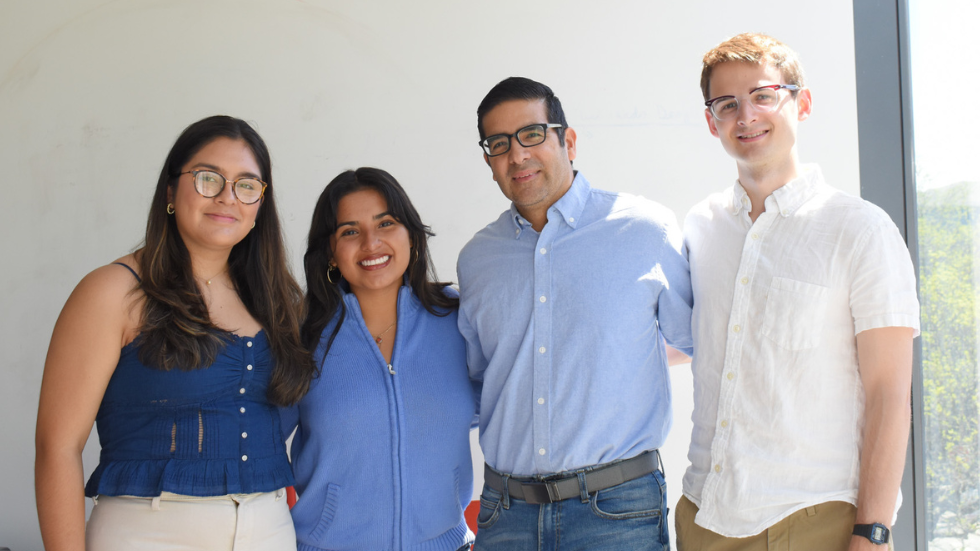Professor David Rangel mentors numerous undergraduate students in academic research on education. His approach to mentoring is reflective, inclusive, and personal, giving students the opportunity to gain essential research skills while clarifying their academic and professional goals.
This is the final article in our series on Professor Rangel’s research and mentorship. The first installment explored his recent scholarship, while the second focused on his approach to guiding and supporting students. In this final piece, we share reflections from three undergraduate research assistants, highlighting the impact of his mentorship on their academic paths and future aspirations.
Building Personal Connections
Professor Rangel’s mentorship is rooted in building meaningful personal connections. John Bellaire, a former student in his Sociology of Education course, recalls how Rangel made an effort to get to know each student individually, even in a large lecture hall. “In one class he told us, ‘If you send me an email, you don't need to introduce yourselves. I know who you are,’” John shared. That personal touch left a lasting impression. Maria Camacho similarly felt seen and engaged in the course, despite its size.
Paola Chapilliquen, who first met Rangel during a freshman pre-orientation presentation, also felt his genuine interest. “His explanation of his classes and teaching style inspired me to introduce myself,” Paola recalled. “When I was in his class in the spring, it felt like a full circle moment.”
For Maria, Paola, and John, these interactions led to opportunities to become research assistants on Professor Rangel’s projects. Each of them became involved after he invited students to join his research during class discussions.
Personal Relevance and Professional Growth
The research projects students work on are highly relevant to their personal and academic experiences. Maria is studying the impact of mixed-class status in Latinx families, exploring how students with one college-educated parent and one non-college-educated parent navigate their identities. “This topic hits close to home as a Latinx first-generation student,” she explained.
Paola is investigating how the education levels of parents influence their children’s outcomes. “The project examines the sociological implications of being a first-generation student, and its effect on educational attainment,” she said.
John’s research focuses on parental involvement in middle-class Latinx families in San Antonio, looking specifically at race and class dynamics. He emphasized how Rangel’s mentorship has helped him develop key research skills.“I first learned how to clean interview transcripts and identify common themes,” John said. “Then I learned how to conduct interviews, write the paper, give a conference presentation, and take ownership over those parts of the project.”
Critical Thinking and Collaboration
All three students emphasized the collaborative and growth-oriented nature of Professor Rangel’s mentorship. “Professor Rangel doesn’t just assign the more advanced tasks to himself. He involves us in every stage of the research process,” John said. “We don’t just observe; we participate in all aspects of the project.”
“I've also had opportunities to mentor other research assistants through that process as well, which is something I've really, really enjoyed,” he continued.
Maria spoke about how Rangel encourages students to reflect critically on their own educational experiences.“We spend time reflecting on how our identities, privileges, and life experiences influence our work and the way we conduct research,” she said. “It’s a dual learning experience that is both academic and personal."
Paola added that Rangel’s approach has helped her reshape how she thinks about curiosity. “He has taught me to step back and approach problems with intention and clarity,” she said. “Professor Rangel makes me feel fearless in asking questions and breaking down complex ideas to understand them better.”
Shaping Academic Futures
Professor Rangel’s mentorship has had a significant impact on his students’ academic and professional goals.
John, now a senior, plans to work at an education nonprofit think tank after graduation.“Without working as a research assistant for Professor Rangel, I don’t think I would have access to these opportunities,” he said. “I’ve developed skills that are crucial for my career, and I’ve discovered a passion for research.”
Paola has found an interest in continuing work in academia. “This experience has shown me that I want to continue in research and contribute to the academic field,” she said.
Maria, too, has taken steps toward her own research goals, developing an independent project studying how a local elementary school acts as a social hub for Latinx and immigrant communities. “I never realized that academic research could quantify real-world experiences, and now I’m eager to pursue it further,” she said.
Professor Rangel’s mentorship goes beyond academic rigor, offering his students intellectual growth, practical experience, and personal reflection. His dedication to their potential has paved the way for future academic and professional success.
For Maria, the most powerful lesson from working with Professor Rangel is this: “The only thing standing between me and my potential is my own mindset.”
